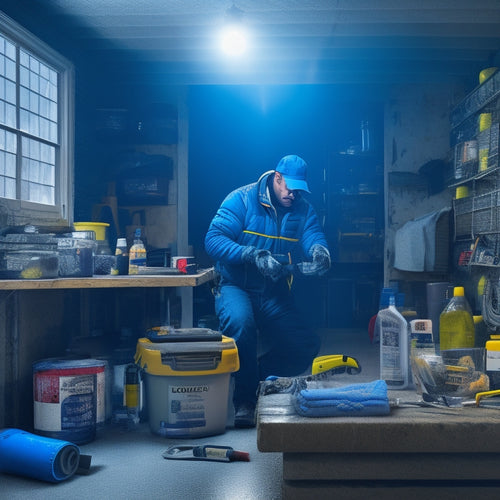
Best Solar Panels for Rooftop
Share
When choosing the best solar panels for your rooftop, you'll want to take into account high-quality brands like SunPower, Panasonic, and Tesla, which offer efficiencies above 20%. Look for 25-year warranties that cover performance guarantees and repair/replacement services. Additionally, balance wattage capacity with available roof space and budget, and reflect on panel aesthetics, durability, and system integration. By evaluating efficiency metrics, you can select the best technology for your needs. With the right panels, you can maximize energy savings and reduce your carbon footprint. Now, take the next step in utilizing the power of solar energy for your home.
Key Takeaways
- Choose high-quality panels from leading brands like SunPower, Panasonic, and Tesla for efficient energy conversion and reliable performance.
- Consider wattage capacity, energy needs, and panel aesthetics to ensure the right fit for your rooftop and budget.
- Look for solar panels with high conversion rates (>20%), advanced technologies, and low temperature coefficients for optimal performance.
- Balance performance and price with budget-friendly options from Trina Solar, Hanwha Q CELLS, and Jinko Solar, and explore government incentives.
- Ensure proper installation and regular maintenance, including monthly debris checks and annual professional assessments, to maximize energy savings and panel longevity.
Top Brands for Rooftop Solar
When it comes to utilizing the sun's energy, a rooftop solar system is only as good as the panels that comprise it. You need high-quality panels that can efficiently convert sunlight into electricity. To make an informed decision, you'll want to investigate brand comparisons and warranty options.
Top brands like SunPower, Panasonic, and Tesla offer premium panels with high-efficiency ratings and durable designs. SunPower's X-Series panels, for example, boast an impressive 22.8% efficiency rating, while Panasonic's HIT-240 panels feature a strong 21.8% rating. Tesla's Solar Roof tiles, on the other hand, offer a sleek, integrated design with a 20.8% efficiency rating.
When evaluating brand options, consider warranty lengths and coverage. SunPower and Panasonic offer 25-year warranties, while Tesla provides a 25-year warranty for its Solar Roof tiles.
Additionally, look for brands that offer extensive warranty coverage, including performance guarantees and repair or replacement services. By assessing your options carefully, you can choose the best solar panels for your rooftop system and maximize your energy savings.
Key Features to Consider
Your solar panel selection process should prioritize essential features that directly impact the system's performance, longevity, and overall value.
When evaluating rooftop solar panels, you'll want to take into account factors that affect the system's ability to generate power, withstand environmental stressors, and integrate with your roof's design.
Wattage capacity is a vital feature to assess, as it determines the panel's ability to produce electricity. Higher wattage capacities typically translate to more power output, but may also increase the panel's size and cost.
You'll need to balance your energy needs with the available roof space and budget.
Panel aesthetics are also significant, as they can impact the system's visual appeal and your roof's curb appeal. Reflect on the panel's color, frame material, and design, ensuring they complement your roof's style and layout.
Additionally, look for panels with durable anodized frames that can withstand harsh weather conditions.
Efficiency and Performance Metrics
Solar panels' efficiency and performance metrics are vital aspects to evaluate when selecting the best rooftop solar panel system for your home. You want to verify you're getting the most power out of your system, and that requires understanding the different efficiency ratings and performance metrics.
When it comes to efficiency, you'll want to look for solar panels with high conversion rates, typically above 20%. This means the panel can convert a higher percentage of sunlight into usable electricity. Currently, the most efficient solar panels are those using bifacial or PERC (Passivated Emitter and Rear Cell) technologies, which can achieve efficiencies of up to 23%.
Performance comparisons are also significant. You'll want to evaluate the panel's temperature coefficient, which measures how well it performs in high temperatures. A lower temperature coefficient means the panel will maintain its efficiency even on hot days.
Additionally, consider the panel's maximum power output, measured in watts, to verify it can meet your energy needs. By evaluating these metrics, you can make an informed decision about which solar panel technology is best for your rooftop system.
Budget-Friendly Options Available
While high-efficiency solar panels may offer superior performance, they often come with a higher price tag. Fortunately, you can still utilize the power of the sun without breaking the bank. Affordable technology has made solar energy more accessible to homeowners, and government incentives can further reduce the upfront cost.
Here's a comparison of budget-friendly solar panels:
| Brand | Efficiency | Price per Watt |
|---|---|---|
| Trina Solar | 18.6% | $2.50 |
| Hanwha Q CELLS | 19.3% | $2.75 |
| Jinko Solar | 20.2% | $3.00 |
| LONGi Solar | 20.5% | $3.25 |
| Canadian Solar | 21.1% | $3.50 |
These options offer a great balance between performance and price. While they may not be the most efficient panels on the market, they still provide a reliable source of renewable energy. By taking advantage of affordable technology and government incentives, you can reduce your energy bills and carbon footprint without sacrificing your budget.
Installation and Maintenance Tips
Get your solar panel system up and running efficiently by following proper installation and maintenance guidelines.
A well-planned installation process guarantees maximum energy output and minimizes potential issues down the line.
During the installation process, confirm your solar panels are installed at the ideal angle and direction to maximize energy production.
Additionally, consider hiring a professional installer who can assess your rooftop's condition and provide guidance on the most suitable installation method.
To maintain your solar panel system's performance, establish a regular maintenance schedule.
This includes:
- Monthly inspections: Check for dirt, debris, or snow accumulation on the panels and clean them as needed.
- Quarterly checks: Verify the system's electrical connections and confirm they're secure.
- Bi-annual maintenance: Perform a thorough cleaning of the panels and inspect the system's inverters.
- Annual assessments: Hire a professional to evaluate the system's overall performance and identify potential issues.
Frequently Asked Questions
Can Solar Panels Be Installed on a Metal or Tile Roof?
You can install solar panels on a metal or tile roof, but you'll need to take into account metal roof considerations, such as ensuring a secure attachment, and verify tile roof compatibility to avoid damaging the roof or panels during installation.
Do Solar Panels Work During Power Outages?
You're wondering if solar panels work during power outages. The answer is, they don't, unless you have energy storage, like a battery. Then, you'll enjoy uninterrupted power, thanks to the stored energy from your solar panel's efficiency.
Are Solar Panels Covered Under Homeowner's Insurance?
You'll be relieved to know that your solar panel insurance is typically covered under your homeowner coverage, protecting your investment from damage, theft, and other unforeseen events, providing you with peace of mind and uninterrupted power.
Can I Install Solar Panels Myself to Save Money?
Like Odysseus steering through uncharted waters, you're considering DIY installation to reap cost savings, but be warned: improper mounting and electrical connections can lead to system failure, voiding warranties and putting your home at risk.
Will Solar Panels Affect My Roof's Warranty?
When you install solar panels, you'll need to evaluate roof warranty implications; you're likely to void your roof's warranty if not done correctly, so it's essential to discuss installation considerations with your roofing contractor and solar panel provider to avoid issues.
Related Posts
-

Waterproofing Solar Panels for Vehicles: A Step-by-Step Guide
When waterproofing solar panels for your vehicle, start by evaluating your energy requirements and selecting the righ...
-

Why Invest in Residential Solar Panel Systems?
By investing in a residential solar panel system, you'll harness renewable energy, reducing your carbon footprint and...
-

10 Best Ways to Purify Urban Air With EVS
You're looking for ways to purify urban air with Electric Vehicles (EVs). You can start by incorporating EVS Air Filt...


